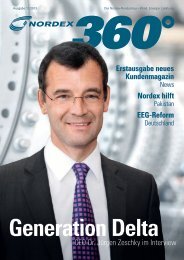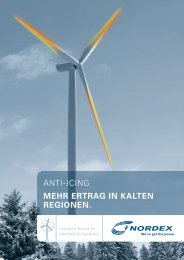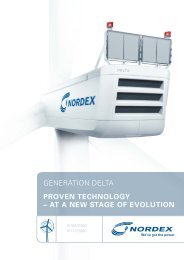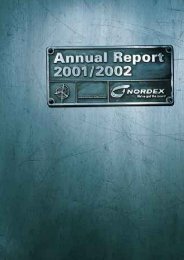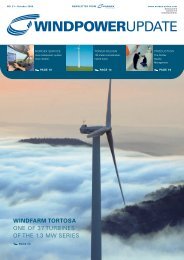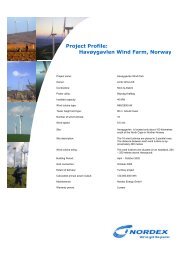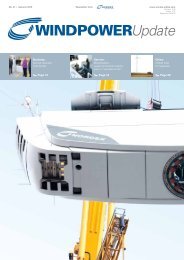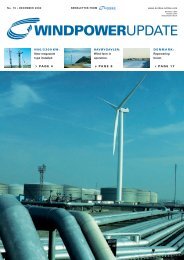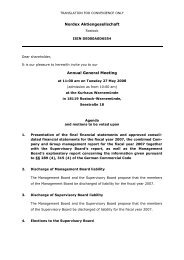OFFERING MEMORANDUM Global Offering of up to ... - Nordex
OFFERING MEMORANDUM Global Offering of up to ... - Nordex
OFFERING MEMORANDUM Global Offering of up to ... - Nordex
You also want an ePaper? Increase the reach of your titles
YUMPU automatically turns print PDFs into web optimized ePapers that Google loves.
The US provides federal s<strong>up</strong>port for operating wind turbines by providing tax credits — so-called<br />
Production Tax Credit. This credit amounts <strong>to</strong> approximately E0.161 per kWh generated from renewable<br />
energy. The US regime <strong>of</strong> granting tax benefits is scheduled <strong>to</strong> continue until the end <strong>of</strong> 2001. The<br />
Company expects this <strong>to</strong> be extended. At an individual state level, the US also s<strong>up</strong>ports the expansion<br />
<strong>of</strong> generating electricity using wind energy as part <strong>of</strong> a so-called Renewable Portfolio System (RPS),<br />
and promotes such generation by stipulating a legally fixed proportion <strong>of</strong> electricity that must be<br />
generated from renewable sources.<br />
A similar system is also implemented in Denmark and the UK, among others. In these cases Energy<br />
s<strong>up</strong>pliers can elect <strong>to</strong> either generate electricity from renewable sources directly, or <strong>to</strong> fulfill this<br />
commitment by purchasing so-called green certificates from wind farm opera<strong>to</strong>rs. These green<br />
certificates need <strong>to</strong> be freely tradable, in order <strong>to</strong> encourage a market for trading in certificates.<br />
However, establishing and maintaining such a trading system can run in<strong>to</strong> problems when it comes <strong>to</strong><br />
practical implementation. For example, Denmark has postponed introducing green certificates until<br />
January 2002, and has stipulated a fixed price <strong>of</strong> 1.3 Eurocents per kWh <strong>of</strong> electricity s<strong>up</strong>ply<br />
(approximately E0.013) until such time.<br />
Promotion <strong>of</strong> renewable energy in developing countries<br />
In developing countries, electricity generation from renewable energy sources is promoted in part by<br />
national development aid programs from industrial nations, which either fully or partially finance wind<br />
farm projects in developing countries or which grant interest-free or low-interest loans for specific<br />
purposes. In addition <strong>to</strong> national programs, the World Bank and international development aid<br />
institutions also fund programs. An additional method <strong>of</strong> advancing electricity generation from<br />
renewable energy in developing countries is granting state guarantees <strong>to</strong> safeguard the delivery <strong>of</strong><br />
wind turbines. During the fiscal year 1999/2000 approximately 20% <strong>of</strong> all wind turbines sold by the<br />
<strong>Nordex</strong> Gro<strong>up</strong> were s<strong>up</strong>plied under development aid programs.<br />
Legal Requirements for Constructing and Operating Wind Turbines<br />
The current legal framework does not permit wind turbines <strong>to</strong> be erected in all locations with sufficient<br />
wind conditions.<br />
In order <strong>to</strong> erect a wind turbine in Germany, a turbine must initially comply with construction, planning<br />
and building regulations, and must comply with the provisions <strong>of</strong> the Baugesetzbuch (BauGB – Federal<br />
Building Code), the Baunutzungsverordnung (BauNVO – Federal Land Utilization Ordinance) and the<br />
relevant state building regulations. In addition, the erection <strong>of</strong> a turbine must also meet the<br />
requirements imposed by the Bundesimmissionsschutzgesetz (BimSchG – German Pollution Control<br />
Act) and regulations relating <strong>to</strong> the preservation <strong>of</strong> nature and the environment. Whether or not these<br />
regulations are fulfilled depends on the individual case. However, according <strong>to</strong> Section 35 paragraph 1<br />
no. 6 <strong>of</strong> the BauGB, wind turbines are granted special privileges, which means that they comply with<br />
the law on planning building projects even if they are erected outside an area subject <strong>to</strong> construction<br />
planning law, where they would otherwise generally not be approved. Approval can, for example, be<br />
withheld because <strong>of</strong> side effects caused by wind turbines, such as increased noise levels. The maximum<br />
permissible noise levels are set out in the Technische Anleitung zum Schutz gegen Lärm (Technical<br />
Instructions on Noise Abatement). Maximum levels <strong>of</strong> permissible shadow cast by the wind turbines are<br />
also imposed. In future, an environmental audit will have <strong>to</strong> be carried out in certain circumstances,<br />
prior <strong>to</strong> the construction <strong>of</strong> wind farms (See ‘‘Risk Fac<strong>to</strong>rs — Legal Risk — General Legal Environment<br />
and Suitable Sites’’).<br />
Specifications imposed by building law and other public law legal requirements for constructing and<br />
operating wind turbines also exist in many other European and Non-European countries.<br />
In Spain, for example, the entitlement <strong>to</strong> build wind turbines is regulated differently in different<br />
regions. In most <strong>of</strong> the Spanish federal states (au<strong>to</strong>nomías) a legal framework for the construction <strong>of</strong><br />
wind farms is now in place. Requirements imposed by pollution control legislation generally play a<br />
lesser role in the approval process, as the population density in most coastal regions is lower in<br />
comparison <strong>to</strong> Germany. Environmental studies and special permission are required for the<br />
31



